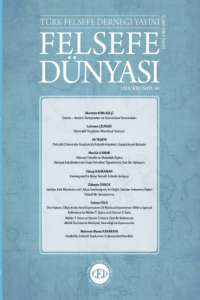Abstract
Bu yazıda normlar mantığının temel kavramlarının ve ilkelerinin sembolik açılımı
Kutschera üzerinden ortaya konulmaya çalışılacak. Bu amaçla eklemler ve yüklemler
mantığının sembolleri kullanılacak ve sembolik işaretler yalnızca kısaltmalar olarak
verilecek. Deontik ve değersel diye iki gruba ayrılan normatif kavramların deontik olanları
emredilen, yasaklanan ve izin verilenler kategorisi dâhilinde değerlendirilecek. Yasaklar
ve izin verilenler, emirler üzerinden tanımlanabildiğinden, “emir” kavramı temel deontik
kavram olarak ele alınacak. Bu sayede, eylem ve eylem tarzları üzerinden çözümlenecek
emirlerin standart bir formu belirlenmeye çalışılacak. Bir eylemi yasaklayan ya da yasaklamayan
önermeler, yani emir ve yükümlülükleri belirten ifadeler iddia cümleleridir. Bu
bağlamda belli koşullar altında belli bir görevlendirmenin nasıl yapıldığı ortaya konularak,
koşullu emir kavramının deontik mantıkta yeri ve önemi tartışılacak.
Çalışmada üzerinde durulacak bir diğer ana tema ise değerler ve değersel kavramların
sembolleştirilmesi olacak. Değersel kavramlar sınıflandırıcı, karşılaştırıcı ve ölçücü olmak
üzere üç grupta incelenecek. Nihayet, doğalcı ve öznelci yaklaşımlara mesafeli durularak,
normlar sisteminin değerler sistemi vasıtasıyla temellendirilme imkânı gösterilecek.
References
- • Atalay, Ahmet Haluk [2006], “Deontik Mantık”, Felsefe Ansiklopedisi, Cilt 4, Ahmet Cevizci (ed.), Babil Yayınları, Ankara, 666-669.
- • Kutlusoy, Zekiye (1997), “Deontik Mantık (Ödev Mantığı) ve Başlıca Sorunları”, Felsefe Dünyası, Sayı 23, ss. 156-164.
- • Kutschera, Franz von (1973), Einführung in die Logik der Normen, Werte und Entscheidungen, Freiburg/München, Karl Alber.
- • Kutschera, Rranz von (1982), Grundlagen der Ethik, Berlin/New York, Walter der Gruyter.
- • Morscher, Edgar (2011). Normenlogik. Grundlagen-Systeme-Anwendungen, Paderborn, Mentis.
- • Özlem, Doğan (1994), Mantık, İstanbul, Anahtar.
- • Poyraz, Hakan (2016), Dil ve Ahlak, İstanbul, Dergâh.
- • Ritter, Ritter (1984), in: Gründer Karlfried (Hsg.), Historisches Wörterbuch der Philosophie. Band 6, Basel, Schwabe.
- • Stemmer, Peter (2008), Normativität. Eine ontologische Untersuchung, Berlin, Walter de Gruyter.
- • Ural, Şafak (1995), Temel Mantık, İstanbul, Çantay.
Abstract
In this article the main concepts and principles of the logic of norms will be analyzed
through symbolic demonstration with reference to Kutschera. With this aim, symbolizations
of propositional logic and predicate logic will be used, and symbolic signs will be
given only as abbreviations. Among the normative concepts, which are classified into two
classes as deontic concepts and evaluative concepts, those, which are deontic, will be examined
in terms of the categories of obligatory, prohibited and permissible. Since prohibitions
and permissions can be defined in terms of orders, the notion of order will be taken as the
main deontic concept. So, a general form of orders, which are articulated in terms of acts
and ways of acts, will be provided. Propositions, which prohibit or do not prohibit an act;
in other words, propositions which state orders and obligations are assertive sentences. In
this context, the significance and the role of conditional propositions in deontic logic will
be discussed by demonstrating how a certain assignment under certain conditions is done.
The other main theme of this article will be the symbolization of values and evaluative
concepts. Evaluative concepts will be examined in three classes: classificatory concepts,
comparative concepts and metric concepts. Finally, the possibility of grounding the system
of norms on the system of values will be manifested without losing the intellectual distance
to both naturalistic and subjectivist perspectives.
References
- • Atalay, Ahmet Haluk [2006], “Deontik Mantık”, Felsefe Ansiklopedisi, Cilt 4, Ahmet Cevizci (ed.), Babil Yayınları, Ankara, 666-669.
- • Kutlusoy, Zekiye (1997), “Deontik Mantık (Ödev Mantığı) ve Başlıca Sorunları”, Felsefe Dünyası, Sayı 23, ss. 156-164.
- • Kutschera, Franz von (1973), Einführung in die Logik der Normen, Werte und Entscheidungen, Freiburg/München, Karl Alber.
- • Kutschera, Rranz von (1982), Grundlagen der Ethik, Berlin/New York, Walter der Gruyter.
- • Morscher, Edgar (2011). Normenlogik. Grundlagen-Systeme-Anwendungen, Paderborn, Mentis.
- • Özlem, Doğan (1994), Mantık, İstanbul, Anahtar.
- • Poyraz, Hakan (2016), Dil ve Ahlak, İstanbul, Dergâh.
- • Ritter, Ritter (1984), in: Gründer Karlfried (Hsg.), Historisches Wörterbuch der Philosophie. Band 6, Basel, Schwabe.
- • Stemmer, Peter (2008), Normativität. Eine ontologische Untersuchung, Berlin, Walter de Gruyter.
- • Ural, Şafak (1995), Temel Mantık, İstanbul, Çantay.
Details
| Primary Language | Turkish |
|---|---|
| Subjects | Philosophy |
| Journal Section | Research Articles |
| Authors | |
| Publication Date | December 15, 2018 |
| Submission Date | July 28, 2018 |
| Published in Issue | Year 2018 Issue: 68 |
Philosophy World is licensed under a Creative Commons Attribution-NonCommercial 4.0 International License.


